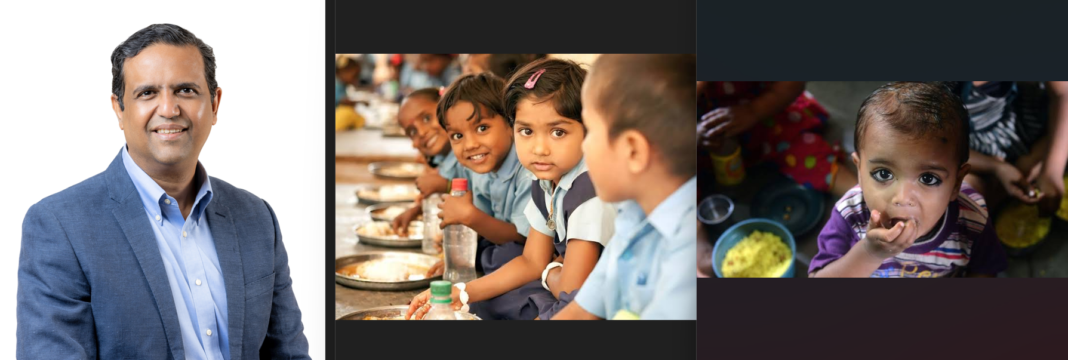With a mission to ensure no child starts their day hungry, Kellanova, India’s Bright Start feeding programme is tackling child malnutrition head-on, providing over 9.3 million meals since 2019. In an exclusive chat with The Pioneer, the founder speaks in detail about this initiative much in detail
Tejal Sinha
In a country where malnutrition remains a pressing issue, with 36% of children under five stunted and 32% underweight, the need for accessible and nutritious food solutions has never been more critical. Addressing this challenge head-on, Kellanova India launched the Bright Start feeding program in 2019 under its global ‘Better Days Promise’. Since its inception, the initiative has provided over 9.3 million meals to underprivileged children, ensuring that they start their day with a nourishing breakfast.
In an exclusive conversation with The Pioneer, Prashant Peres, Managing Director, South Asia at Kellanova, sheds light on the inspiration behind the program, its impact and the company’s vision for the future.
Peres explains that the program was born out of a deep concern for India’s widespread malnutrition crisis. “We recognised that micronutrient deficiencies severely affect children’s cognitive development, immunity, and overall growth. A nourishing breakfast is essential to bridge this gap. Through Bright Start, we provide fortified cereals with milk, an accessible and nutrient-dense solution.”
Initially launched as a pilot program serving 1,500 children, Bright Start has since grown to reach over 17,500 children weekly across Maharashtra, Gujarat, Andhra Pradesh and Karnataka. The initiative aims to nourish 400 million people facing food insecurity by 2030.
With its rapid growth, Bright Start has already served 3.3 million meals in 2024 alone. Peres emphasises that the program’s long-term vision is to expand further, ensuring that more children receive the essential nutrients they need. “We are committed to scaling our impact year on year. By 2030, we aim to reach a significantly larger number of children, tackling morning hunger on a much broader scale.”
Targeting the most vulnerable communities has been central to Bright Start’s mission. The programme prioritises underprivileged areas where access to balanced nutrition is limited. “We’ve focused on regions across Maharashtra, Gujarat, Andhra Pradesh and Karnataka,” Peres explains. “Working closely with NGO partners like Shri Satya Sai Annapoorna and The Breakfast Revolution, we ensure that nutritious breakfasts reach children in both urban and rural areas.”
One of the key reasons these regions were selected is the high prevalence of malnutrition and food insecurity among children. Through strategic local partnerships, they have been able to distribute fortified, multigrain cereals with milk, ensuring children receive a consistent, balanced meal.
For any large-scale nutrition programme to be sustainable, collaboration is key. He credits Bright Start’s success to a well-structured partnership model. “We work closely with NGOs, local communities and government bodies,” he says. “For instance, in Karnataka, the state government provides milk, while Kellanova supplies Kellogg’s cereals and sponsors Sai Sure Fortified Ragi in collaboration with Annapoorna Trust, enhancing the nutritional value of school meals.”
Similarly, in Andhra Pradesh, the state government has granted permissions for the initiative, allowing Kellanova and Annapoorna Trust to jointly implement the Morning Feeding Programme in rural schools. This collaborative approach ensures that children receive a nourishing start to their day without financial burden on their families.
Since its launch, they have made a tangible difference in children’s health and well-being. Teachers and school authorities have reported notable improvements in students’ immunity, energy levels and overall growth.
Peres shares a story from a rural school in Chikkaballapura, Karnataka, where the program has had a profound impact. “Previously, students were provided plain milk, which many found difficult to consume. With the introduction of products like Chocos along with milk, children now enjoy their breakfast, leading to increased participation and improved health.”
School principals have also observed noticeable growth in students’ height and weight, reinforcing the importance of fortified nutrition in early childhood development.
Running a large-scale feeding program comes with its challenges, particularly in coordinating with multiple stakeholders. However, Peres believes that a shared commitment to tackling malnutrition has helped overcome these hurdles.
Neelam Jethwani, Managing Trustee at Decimal Foundation, has been a strong advocate of the programme. “Breakfast fuels a child’s learning, growth and success, fostering active minds, healthy bodies and positive ambitions. We are grateful to Kellanova India and our on-ground partners for enabling the nourishment of thousands of urban and rural children in Maharashtra and Gujarat.”
Looking ahead, they remain committed to expanding Bright Start, strengthening its partnerships, and reaching more children in need. “We believe that no child should start their day hungry. With the continued support of our stakeholders, we are determined to make nutrition accessible to the communities that need it the most.”
As Bright Start continues to grow, it stands as a testament to the power of collaboration, innovation, and purpose-driven action in addressing one of India’s most pressing challenges—child malnutrition.




